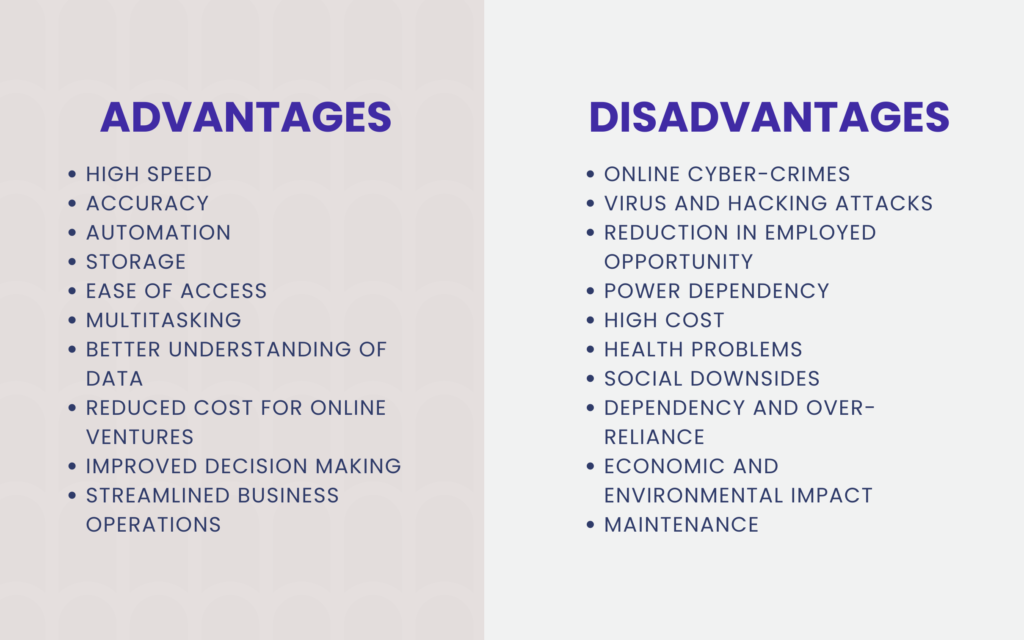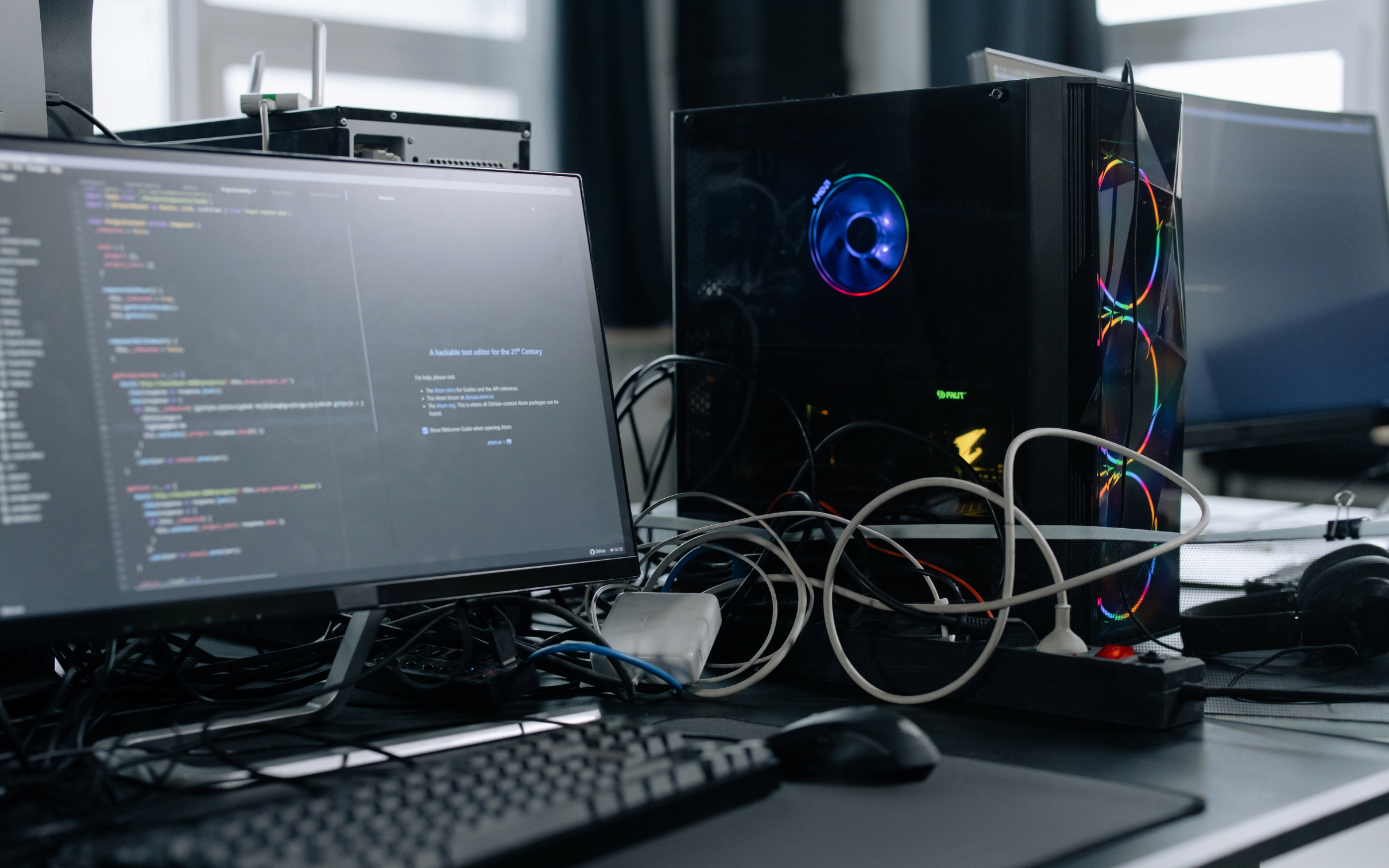Today, computers are essential tools that have changed the way we work, talk to each other, and receive information. There are some good things about these powerful tools, but there are also some bad things. To fully understand how computers affect society, it’s important to look at both their pros and cons.
For many of us, computers have changed the way we work, talk to each other, and get information. Computers have changed our world in ways we didn’t expect, like making us more productive and giving us access to a lot of information.
But along with these benefits, there are also risks to our health and our privacy that we need to be aware of. Come with me as we talk about the advantages and disadvantages of computer and how they affect our daily lives.
What is Computer?

A computer is an electrical device that executes data by instructions given by computer programs. Computers can execute a wide range of tasks, ranging from basic calculations to complex operations including artificial intelligence (AI).
There are two main parts of a computer: software and hardware. The software directs the hardware to what tasks it should perform as well as how to execute them as well. The hardware is in charge of carrying out those tasks.
Charles Babbage (1791 – 1871) is often referred to as the “father of the computer.” He is credited with promoting the concept of programming and the idea of automating computation.
Characteristics of Computer
- Speed: Computers offer exceptional processing speeds, swiftly executing complex calculations within milliseconds.
- Precision: Computers are not subject to faults caused by fatigue or distraction, guaranteeing accurate results.
- Storage Capacity: Modern computers can store huge amounts of data, surpassing the memory powers of humans.
- Multitasking: Computers are excellent at multitasking, meaning they can efficiently handle multiple tasks at the same time without any negative impact on performance.
- Consistency: Computers show solid stability while performing repetitive tasks, ensuring the maintenance of quality over time.
- Complex Solutions: Computers possess the ability to adapt to a wide range of applications, ranging from basic computations to complex simulations, showcasing their versatility.
- Connectivity: Computers enable worldwide communication and the exchange of information through networks.
- Automation: They may be programmed to carry out activities automatically, thereby enhancing efficiency and decreasing the burden on humans.
- Cost-effectiveness: Despite a considerable upfront cost, computers are economically advantageous in the long term due to their ability to save time and resources.
- Uninterrupted Functioning: Computers can operate continuously, without the need for breaks, which allows them to achieve maximum productivity.
Role of computers in modern society
Computers have become a key role in our modern society, entirely affecting our way of life, work, and communication. Although they have many benefits, it is important to also consider possible disadvantages.
Computers have greatly enhanced productivity in various industries by facilitating faster data processing, intricate calculations, and reduced information management. They have created new opportunities for education, entertainment, and worldwide communication, establishing the limitations of distance and encouraging creativity.
Yet, heavy use of computers also brings about limitations. Excessive dependence on technology can result in a decline in relationship-building and social abilities. In the modern age of technology, the growing importance of data privacy and cybersecurity cannot be ignored.
As our lives become more connected with technology, these concerns have rightfully taken center stage. The quick rate of technological advancement can also lead to an online breakdown, which may exclude people who lack access to or familiarity with computers.
Despite challenges, the benefits of computers greatly exceed all disadvantages. With an in-depth knowledge of both perspectives, we can effectively employ the abilities of computers while also addressing any possible disadvantages, resulting in a compatible and progressive formation of technology in our society.
Top 10 advantages and disadvantages of computer

Advantages of Computer
Computers have become an essential part of our daily lives. Communicating with people from all around the world is incredibly efficient and effective. We can effortlessly retrieve information from any location and at any given moment. Computers are invaluable tools for expanding our knowledge. Here are some of the key advantages of computers:
1. High Speed
One factor contributing to the enhancement of quality of life is the rapid speed of personal computers. Modern computers are incredibly fast, allowing us to complete tasks in a matter of seconds. Imagine you have the desire to watch a video. You’ll effortlessly navigate to YouTube and locate the desired video in a matter of seconds.
2. Accuracy
Mistakes are a natural part of being human. Therefore, when conducting intricate calculations, we verify our work by using a calculator. Computers’ exceptional accuracy lends them a high level of dependability. You’ll have confidence in the information or answers provided by a calculator solely because of its precision.
3. Automation
Many tasks can be automated, resulting in significant time savings. For example, rather than manually calculating figures such as the mean or median of a large dataset, we simply utilize Excel. This method is highly efficient, guaranteeing complete precision and saving a significant amount of time.
4. Storage
Computer storage capacity is typically measured in gigabytes (GB) or larger. Our computers allow us to conveniently store and access a variety of media, such as videos, images, and games, once they have been downloaded.
5. Ease of Access
Imagine we need to find a book in a library, with only the title as our clue. It would be a challenging endeavor. However, when using a computer, simply enter the file name and presto! The convenience offered by our personal computers helps us save time and effort.
6. Multitasking
Working on multiple tasks at once is what multitasking entails. Imagine you come across an article online and you find yourself needing to jot down the definitions of unfamiliar words. One option is to use Google to search for facts. Once you find what you’re looking for, you can save the meaning in a Word file and then proceed with reading the article. This is just one example of the many tasks that computers can handle simultaneously.
7. Better understanding of data
Computers offer a wide range of tools for data analysis and mining. Organizations leverage the power of computers to facilitate data analysis and visualization, which proves invaluable for informed decision-making.
8. Reduced Cost for Online Ventures
Having access to cheap computers and laptops with internet connectivity is a great advantage for start-ups that operate online. Reducing infrastructure, inventory, and rent expenses, it effectively lowers the cost. All they require is a team equipped with laptops, internet connectivity, and industry-specific software licenses.
9. Improved Decision Making
Computers play an important part in data analysis, helping businesses and individuals to make sensible choices. Utilizing advanced algorithms and innovative AI, computers can efficiently analyze vast amounts of data, recognize recurring patterns, and derive significant insights.
These insights are valuable for making informed decisions in business strategy, financial planning, healthcare diagnostics, and scientific research.
10. Streamlined Business Operations
In the business world, computers are essential for improving operations. They handle the automation of inventory management, customer relationship management, accounting, and supply chain operations. Computers enable reduced communication, smooth team collaboration, and immediate data analysis, resulting in higher efficiency, savings, and increased satisfaction.
Disadvantages of computer
1. Online Cyber-Crimes
Just like any other device, computers are at risk of cyber crimes. The theft of information poses a significant risk in the realm of computer technology. It can happen either online or through a removable device such as a USB.
2. Virus and hacking attacks
Viruses can take the form of worms, while hacking involves gaining unauthorized access to a computer for nefarious purposes. Viruses can spread to other systems through various means, such as email attachments, infected website advertisements, and removable devices like USBs.
3. Reduction in employed opportunity
People from earlier generations who were not familiar with computers faced major difficulties when computers became common.
4. Power Dependency
A power supply is essential for the activation and optimal performance of a desktop computer. The functionality of the personal computer is heavily reliant on the availability of electricity. Despite the availability of UPS as a backup power resource, the great dependence of computers on energy continues to be regarded as an important disadvantage and limitation of computer systems.
Similar to desktop computers, laptops are equipped with batteries that supply almost all of the battery life needed to perform their operation, eliminating the need for a main power source. These batteries need to be refilled at regular intervals to function as a backup power supply for the computers.
5. High Cost
Computers have a high cost. Even the most economical computers remain too expensive for the average individual in India. Computers enable individuals.
6. Health Problems
Extended usage of computers for work results in a variety of health issues. Excessive computer use can hurt the user’s seating posture as well as cause eye irritation.
7. Social Downsides
The use of computers results in a digital divide between those who have varying degrees of access. It is possible that this could occasionally result in feelings of alienation and detachment.
8. Dependency and Over-Reliance
An over-dependence on computers as a source of information and solutions might be harmful to a person’s ability to think logically. The capacity to carry out duties without the assistance of technological devices is diminished.
Challenges in performing daily tasks when one does not have access to computers and the internet. Skills such as handwriting, mental arithmetic, and other manual abilities are deteriorating.
9. Economic and Environmental Impact
Automation and artificial intelligence are taking over jobs that used to be done by people. There are problems with the economy for people in some fields. Get rid of old computers and other electronics that are polluting the earth. Accessing modern tools and opportunities can be hard for disadvantaged groups.
10. Maintenance
It is necessary to perform routine maintenance and upgrades on computers.
Final Words
When reviewing the Top 10 advantages and disadvantages of computers, it is clear that the advantages significantly outweigh the disadvantages.
Although there are serious issues regarding privacy, security, and screen time, the transformative influence of computers on our daily lives is immeasurable. They have transformed communication, optimized work processes, and expanded educational opportunities.
The benefits of improved creativity, access to information, and higher efficiency are simply too substantial to overlook. We must confront the obstacles associated with computer usage as we progress; however, we must also recognize the extraordinary potential that these devices possess.
By doing so, we may take advantage of computers to improve our excellent of life, and solve more complex problems.
FAQs
Q: What are the main advantages of computers?
Computers have many benefits, such as making people more productive, giving them access to a lot of knowledge, making communication better, and letting them automate difficult tasks. They also make it possible to store and analyze data, as well as learn and have fun.
Q: What are the primary disadvantages of computers?
Computers are useful tools, but too much use can cause privacy issues, security risks, and even health problems. In some businesses, they may also cause people to lose their jobs, and they can be a distraction.
Q: How do computers impact our daily lives?
Computers have changed the way we work, talk to each other, and get knowledge. They are now an important part of fields like healthcare, education, and finance, and they make a lot of jobs easier to do and faster.
Q: Are computers making us less social?
Computers and the internet make it easier for people all over the world to meet, but too much use can make face-to-face interactions less common. It is important to keep a mix between socializing online and in real life.
Q: How can we mitigate the negative effects of computer use?
To keep problems to a minimum, use good digital habits, take breaks often, set privacy settings, and learn about cybersecurity. Finding the right balance between computer use and other tasks is important for getting the most out of computers while avoiding their problems.



